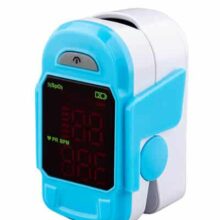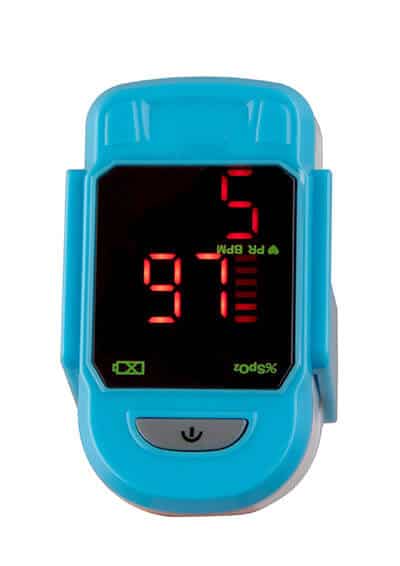Oxymètre de pouls au bout du doigt, standard
Login For Health Care Pricing
En stock
The fingertip pulse oximeter from Baseline can measure oxygen levels in the body as well as the pulse rate right in the comfort of your home.
Oximeters are valuable devices used in sports medicine to measure oxygen saturation levels in the blood. These instruments play a crucial role in assessing an athlete’s respiratory function, monitoring oxygen delivery to tissues, and optimizing performance.
Oximeters provide real-time data that helps healthcare professionals evaluate an athlete’s physiological response to exercise, identify potential issues, and guide interventions.
In this article, we explore the uses of oximeters in sports medicine and their significance in monitoring oxygen saturation and enhancing athletic performance.
Oximeters are primarily used to monitor oxygen saturation levels in sports medicine. Oxygen saturation refers to the percentage of hemoglobin in the blood that is bound to oxygen. During exercise, the demand for oxygen increases, and monitoring oxygen saturation provides insights into how well an athlete’s body is delivering oxygen to working muscles. Oximeters measure oxygen saturation noninvasively, typically through a clip-like sensor attached to a finger, earlobe, or other peripheral sites.
This real-time monitoring allows healthcare professionals to assess an athlete’s oxygenation status during different exercise intensities and evaluate how well their body is adapting to the demands of physical activity.
Oximeters help healthcare professionals assess an athlete’s exercise tolerance and endurance by monitoring changes in oxygen saturation levels during exercise.
By tracking oxygen saturation patterns, healthcare professionals can determine if an athlete is maintaining adequate oxygenation during prolonged or intense physical exertion. Persistent drops in oxygen saturation may indicate reduced exercise tolerance, inadequate respiratory function, or other underlying issues that need to be addressed.
Monitoring oxygen saturation levels allows for personalized training adjustments, exercise prescriptions, and conditioning programs to optimize endurance performance.
Oximeters assist in evaluating an athlete’s respiratory function and detecting potential respiratory issues.
Monitoring oxygen saturation levels can help identify exercise-induced asthma, bronchoconstriction, or other respiratory conditions that may affect an athlete’s performance. Significant drops in oxygen saturation during exercise may suggest inadequate oxygen uptake or impaired lung function.
By detecting such issues, healthcare professionals can initiate appropriate interventions, such as inhaler use, breathing exercises, or referral to a respiratory specialist, to manage respiratory conditions and optimize an athlete’s performance potential.
Oximeters play a vital role in monitoring altitude adaptation in sports medicine. When athletes train or compete at high altitudes, where the oxygen concentration is lower, their bodies must adapt to the reduced oxygen availability. Monitoring oxygen saturation levels allows healthcare professionals to assess an athlete’s adaptation to altitude and determine if they are experiencing hypoxia or inadequate oxygen delivery.
This information guides altitude training protocols and helps identify athletes who may benefit from additional interventions, such as supplemental oxygen or altitude simulation devices, to optimize their performance at high altitudes.
Oximeters are valuable tools for monitoring an athlete’s recovery from intense exercise or injury. Oxygen saturation levels can indicate how well an athlete is recovering and whether their body is efficiently replenishing oxygen stores.
Monitoring oxygen saturation during the recovery period allows healthcare professionals to assess the adequacy of oxygen delivery, detect any lingering effects of intense exercise or injury, and guide the implementation of recovery strategies such as appropriate nutrition, hydration, and rest.
Monitoring recovery helps prevent overtraining, optimize training load, and minimize the risk of subsequent injuries.
Oximeters are indispensable devices in sports medicine, providing real-time monitoring of oxygen saturation levels in athletes. By assessing oxygenation status, healthcare professionals can evaluate an athlete’s physiological response to exercise, identify potential respiratory issues, and optimize training and performance strategies.
The use of oximeters enables personalized training adjustments, altitude adaptation monitoring, and accurate evaluation of exercise tolerance and recovery.


Login For Health Care Pricing
En stock
The fingertip pulse oximeter from Baseline can measure oxygen levels in the body as well as the pulse rate right in the comfort of your home.